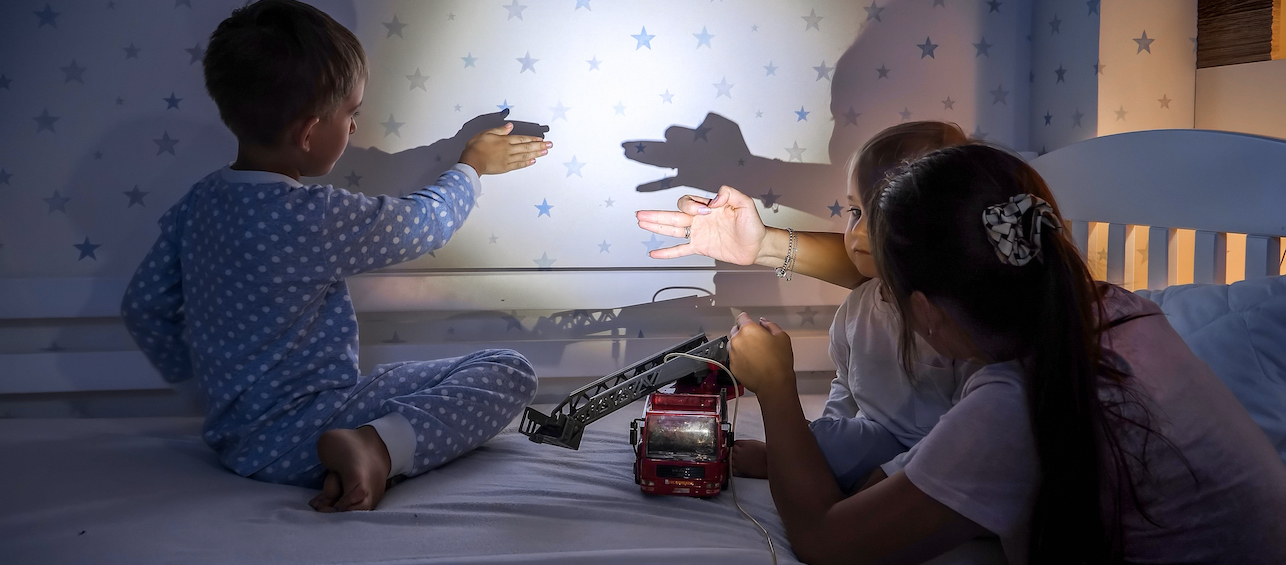It’s quite common for kids to be afraid of the dark. If this sounds like what’s going on in your home, you’re not alone. Of kids age 12 and under, as many as 45-80% have a fear of darkness at some point in their childhood.
This fear tends to increase and be at its height around ages 7-9. The good news is that by age 12, most kids grow out of their fear of the dark.
When children are afraid of the dark, it can be distressing for them and exhausting for you. So how can you help a child who has this fear? Read on for tips to help your family manage this stage of childhood.
Why Do Kids Become Afraid of the Dark?
- A fear of the dark is not necessarily just about the dark; it can be more about what kids think might happen in the dark.
- Sometimes a fear of the dark is more about fear of separation. Being left alone can be scary after a full day of being with others. Kids pick up on messages about the dark that are around them, whether on TV, in books, or through general conversation.
- A lot of children have active imaginations, which is a great strength during the day. But at night, that can work against them.
- Children who tend to worry a lot, be more scared or are anxious might be more prone to becoming afraid of the dark.
Strategies to Use When Your Child Is Afraid of the Dark
If you’re able to, find out what it is about the dark that bothers your child. Their fear is very real to them, whether it’s being afraid of monsters or a house break-in. How you address the fear should vary depending on if their fear is a real safety concern versus something that exists only in their imagination.
Here are some tips you can start using at bedtime tonight to help gain control over this fear:
1. Exude confidence and validation when your child faces a feared situation.
Kids pick up on the signals we send. If you show fear or uncertainty, your child will sense that. Instead, be positive and matter-of-fact when talking this through with your child.
This can sound like: “You can do this, you’ve got this. You’re scared and I know we can do it.” Make it simple and straight to the point.
2. Praise your child after they face fears.
Make a big deal of it when your child has been brave and accomplished something hard for them. If a challenge has been staying in their bed all night and they’ve done that, reinforce it with a lot of praise.
This can sound like: “You did such a great job staying in your bed! Mom and Dad are so proud of you! Grandma is so excited you were able to do that!”
3. Create a good bedtime routine and stick to it.
This might include reading a set number of books, saying prayers, or singing a favorite lullaby. Whatever it is, keep it consistent and avoid big changes in the routine from night to night. Then end with positive talk.
This can sound like: “We’ve we had our time together. It was wonderful. I love you. You’ve got this. Good night.”
4. Have some ways to relax at night.
This can be built into the bedtime routine. It can include things like breathing exercises, listening to soothing music, or a transition object that brings your child comfort. For a younger child, this could be a blanket or stuffed animal. An older child might like to have their favorite hat on their bedpost.
Some families use white noise as part of the bedtime routine. Do so in moderation so it doesn’t become a crutch that gets in the way of your child’s ability to get a good night’s sleep.
In general, using a night-light for most kids is fine. Keep it dim so it doesn’t affect sleep patterns or lead to avoiding the dark altogether.
5. Be curious instead of answering questions.
This can help children think harder about what they think is fearsome. When your child asks, “Are there monsters in my closet?”, you might automatically answer, “Of course not.” Instead, ask questions back so they become their own investigator.
This can sound like: “Have you seen a monster in your closet before?”
6. Practice being in the dark.
This can be done outside of bedtime and can be a good way to show that darkness isn’t scary.
This can look like: Creating shadow puppets on the wall in a dark room, having a dance party with a few glow sticks, having a candle light picnic in the living room. These efforts can show your child that they can handle being in the dark and can master it.
When to Seek Professional Help
Ask yourself these questions when determining if you might want to seek professional help for your child’s fear of the dark:
- How distressed is your child? Are they crying a lot or having panic attacks?
- How much of your child’s night is being impacted by this fear? Are they able to sleep in their own bed all night? Are they losing sleep?
- Is the fear impacting daytime behaviors? Is your child missing out on activities or having a lot of tantrums?
- Is your child’s fear related to a traumatic experience they have lived through?
Your answers to these questions can help guide you toward seeking support. Kids who are significantly affected by their fear could benefit from professional help. Start by having a conversation with your pediatrician. From there, they can talk with you about a potential referral to a psychologist, counselor or therapist.
It is so gratifying to see a child who has overcome a fear that is very real to them. I hope these strategies assist you in helping your child face their fear of the dark tonight!
For more information about Behavioral Medicine and Clinical Psychology or to schedule an appointment, please call 513-636-4336.






